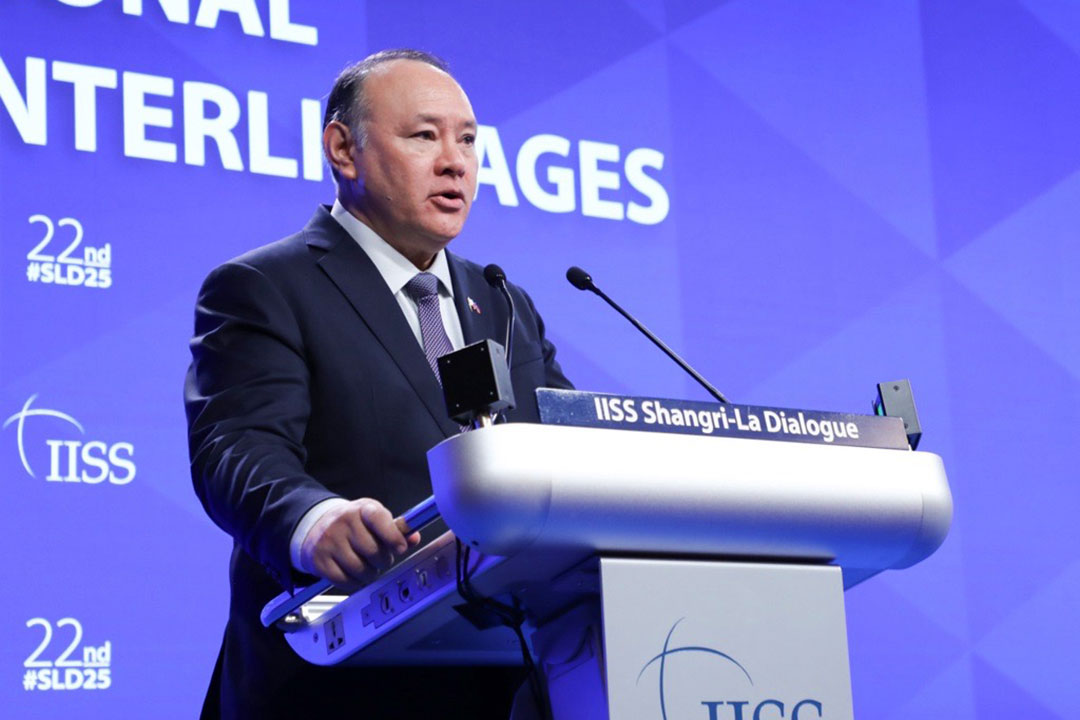
By Kenneth Christiane L. Basilio, Reporter
TALKS between the Philippines and China on their South China Sea dispute must be built on mutual trust to ensure progress, Manila’s defense chief said on Sunday, stressing that Beijing must first build credibility before meaningful dialogue can take place.
Speaking at the Shangri-La Dialogue in Singapore, Philippine Defense Secretary Gilberto C. Teodoro, Jr. said China has a “deficit of trust” in relation to the disputed waterway, making reference to Mischief Reef, a disputed atoll in the contested Spratly Islands that Beijing fortified into a military base after an intense infrastructure build-up in the last decade.
The Chinese Embassy in Manila did not immediately reply to a Viber message seeking comment.
“For dialogue to be effective, it must be coupled with trust,” Mr. Teodoro said during the security forum’s plenary session, based on a Youtube livestream. “That is the biggest stumbling block to dispute resolution or dialogue with China.”
“China has a lot of trust-building to do to be an effective negotiating partner in dispute settlement,” he added.
Manila and Beijing have repeatedly locked horns over disputed features in the South China Sea, leading to escalating tensions as both remain firm in their claims in the waterbody that serves as a vital shipping route for global trade.
China claims nearly all of the potentially mineral- and oil-rich South China Sea based on a 1940s nine-dash line map that overlaps with the exclusive waters of the Philippines and neighbors like Vietnam and Malaysia.
A United Nations-backed tribunal in 2016 voided China’s sweeping claims for being illegal, a ruling that Beijing does not recognize.
“China says that it has peaceful intentions. [If so,] why does it continue to deny the Philippines its rightful provenance under international law?” said Mr. Teodoro.
Chinese ships have repeatedly barred Filipino fishermen from accessing Scarborough Shoal, which lies within Manila’s exclusive economic zone. The atoll is a vast fishing lagoon near major shipping lanes that China seized in 2012 after a standoff with Philippine troops.
The disputed shoal has been a source of tension between Manila and Beijing, whose bigger coast guard vessels frequently fire water cannons at Philippine ships to discourage them from getting closer to the feature.
Mr. Teodoro called for a need to form “flexible, issue- and needs-based groupings” to bypass gridlocks in traditional international institutions. “These developments are driven by gridlocks in the decision-making of multilateral organizations.”
“We must enhance cross-regional security cooperation,” he said. “Among the concrete measures we can take are joint strategic dialogues, such as trilateral or quadrilateral summits among regional blocs on shared security concerns.”
On Saturday, Mr. Teodoro met with top defense officials of Australia and Japan, including US Defense Secretary Peter Brian Hegseth, marking the fourth multilateral security meeting between the nations in three years, the Department of National Defense (DND) said in a statement.
The Philippines is a member of the Squad, an information grouping with Australia, Japan and US, and whose military forces have conducted joint sails in Manila’s exclusive waters within the disputed South China Sea since last year.
“The defense leaders expressed continued serious concern about China’s destabilizing actions in the East China Sea and the South China Sea, and any unilateral attempts to change the status quo by force or coercion,” the Defense department said, particularly China’s “dangerous” actions against the Philippines and other countries.
The grouping agreed to help the Philippines’ force improvement efforts by deepening defense cooperation in infrastructure investments in Manila, DND said.
Australia, Japan, the Philippines, and the US also pledged to strengthen maritime cooperation in the South China Sea, committing to more frequent joint drills to enhance regional security.
“They also reached consensus to explore planning joint intelligence, surveillance and reconnaissance activities to improve interoperability and coordination on effective maritime and air domain awareness,” it said.
Sweden and the Philippines also explored possible joint military training and ship visits in the future, the DND said in a separate statement on Sunday.